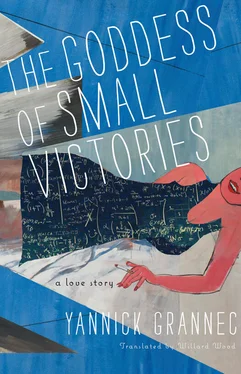“Mrs. Clarck, I’d like to speak to Leonard right away. Call his lab at MIT and tell the receptionist to wake up the guy sleeping on the pile of empty pizza boxes.”
14. JANUARY 1936: Necessary but Not Sufficient
Hell could invent no greater torture than of being charged with abnormal weakness on account of being abnormally strong.
— Edgar Allan Poe, “The Accursed Intellect”
I wanted to believe, as his family did, that his first episode of depression would come to seem like just a bad incident. His health would improve when we were together, I was all he needed. Order would return and disorder recede. But after he came back from the United States in 1934, Kurt collapsed again and had to take a long rest cure.
His second episode of depression started right after Hans Hahn died. His thesis adviser succumbed to an aggressive cancer shortly before Dollfuss’s assassination. Kurt was still at Princeton and felt horrible that he couldn’t be there for Hahn during his last moments. The disease killed Kurt’s mentor in just three months. Another father he hadn’t said goodbye to.
Entropy, he could have told himself: the disorder in a system increases. A broken teacup will never glue itself back together. The universe is disorder, revels in disorder, engenders disorder.
The Purkersdorf Sanatorium thus became his second home. I found myself having to wait for his rare outings. I was allowed a furtive embrace, dinner of a sort, and sometimes even a night at the movies with Kurt before he would rush off to his mother to show her the progress he’d made. His temporary leaves from the sanatorium were always in her hands. Redheaded Anna had persuaded me not to ask for more: “You have to be strong for both of you, Adele. That’s your mission. And be happy that you have a mission, since most people don’t know what to do with their stupid lives.”
Kurt never spent very long in Vienna, where the perpetual stress sapped his limited energy. The university was being drained of its life force: Jewish intellectuals and those who failed to sympathize with the Nazis were being replaced by “good Austrians” who had declared their allegiance to Chancellor Schuschnigg, Dollfuss’s successor, and to the ruling National Socialist Party. Hitler, for all his disavowals, was preparing for the Anschluss; the hyena was already pissing on the border. Only Mussolini’s reluctance kept him in check. By now the intelligentsia were leaving Austria en masse. Kurt was losing his closest friends, and also the fertile environment that he needed for thinking.
Despite his fragile health, Kurt blithely accepted a second engagement to lecture at Princeton starting in the fall of 1935. I stormed, begged, and threatened to break off our relationship, but he wouldn’t give in. His family and his medical team also tried in vain to reason with him. Although his own brother was a radiologist, Kurt was suspicious of doctors. He trusted only books. But when he started studying more medical texts than philosophical or mathematical ones, a return to the psychiatric ward threatened. There were numerous signs of depression over the summer. Rudolf couldn’t have ignored them, and he should never have allowed his brother to travel. Kurt was hardly eating at all, spreading his food in tiny pieces around the edge of his plate to hide his loss of appetite. He complained about his teeth and his stomach. He wasn’t sleeping. He didn’t even go to bed anymore. He never touched me, or if he did it was only in a parody of coupling, meant to end any talk of it. Kurt was naturally taciturn, but now silence was starting to inhabit him.
Kurt left for America in the fall, leaving me to ponder my lack of influence over this weak, stubborn, and ill-cared-for man. A few days after arriving in Princeton, he felt himself sinking. In his last letter, Kurt wrote that Flexner had found him an American doctor who was recommending his immediate return to Vienna. By the time the letter reached me, he was already en route. Veblen, ever helpful, had seen him onto a boat bound for Europe and promised not to alarm his family. He did however send a telegram to Rudolf letting him know that his brother was landing at Le Havre on December 7. Kurt dragged himself in a near coma to Paris, where he telephoned his older brother for help. To no avail. He stayed in Paris for three days before finding the strength, I can’t imagine how, to travel by train to Vienna. Alone.
I could never persuade him to tell me the story of those three days, but I know that they were extraordinarily painful. The few small details I obtained took years of prying. I’ll never know. I’ll never be him. Even today, I can only imagine his suffering: a man standing in front of a bed in the bad light of a hotel room.
I see him folding and unfolding his clothes to keep his hands busy. Washing them and drying them on towels embroidered with the pompous monogram of the Palace Hotel. Going down to the dining room and ordering a meal he will never touch. The waitress is pretty. She smiles at him. He manages to say a few words to her in French. He returns to his room by the staircase in an attempt to measure time physically. He concentrates for a moment on the number of his room key looking for a sign. He opens and closes the door wondering if he is doing it for the last time, if he is taking off his jacket and sitting on this chair for the last time. He smells the faint trace of the room’s previous occupants lingering in the air. He reaches for his notebook, he opens and closes it, strokes the moleskin cover. He thinks back to the waitress’s smile. Immediately, he thinks of me, of our last meeting on the station platform. He can’t summon a distinct memory of my face. He says to himself: Strange how the most familiar things are sometimes impossible to describe. He thinks of Hans Hahn. He thinks of his father. Then he has an idea. Fleeting, it glides through his mind before vanishing into the depths: a carp on the surface of a turbid pond. There, in a chair that hurts his back, he sits quite still so as not to startle the thought. He doesn’t even try to open his notebook. He thinks that the thought is still possible, if he stays where he is and makes no motion. No disturbance to the muddy water. He remembers our last argument, my crude words, the kind you fling at a man like a slap in the face when he refuses even to breathe: “You’re a man, for Christ’s sake! Eat! Sleep! Fuck!” He doesn’t know how long he’s been in this chair. His back keeps a record of the passing hours, and he welcomes the pain. At dawn he shuts the window and packs his bag.
As someone who would spend his whole life committing suicide, he could have cut his suffering short right there in Paris. No one would have been there to stop him. But he came home to Vienna and checked in to the sanatorium of his own volition. Why he renounced death isn’t explained by my love for him, nor by his mother’s love, nor by his faith. He must have been obeying another and far stronger injunction: the last struggle of his body against the anthropophagy of his mind.
Perhaps I am condemned to see duality where there is none.
One morning in January 1936, looking out through the clutter of my father’s shop window, I recognized Kurt’s brother on the sidewalk. I thought: Kurt is dead. Why else would Rudolf make the effort to contact me? Ever since Kurt’s disastrous return from Paris, I had lived in limbo. Kurt was in strict isolation at Purkersdorf, and even redheaded Anna could no longer help me see him. The meager information to be gotten from his nurses was far from reassuring. He refused to eat and, groggy from drugs, spent his days sleeping. I couldn’t face either of the two likely outcomes: that I would wait for a man who was locked away and had no hope of recovery, or that I would become a widow but without the right to wear mourning. I couldn’t even run away. I was just an onlooker at a train wreck.
Читать дальше












